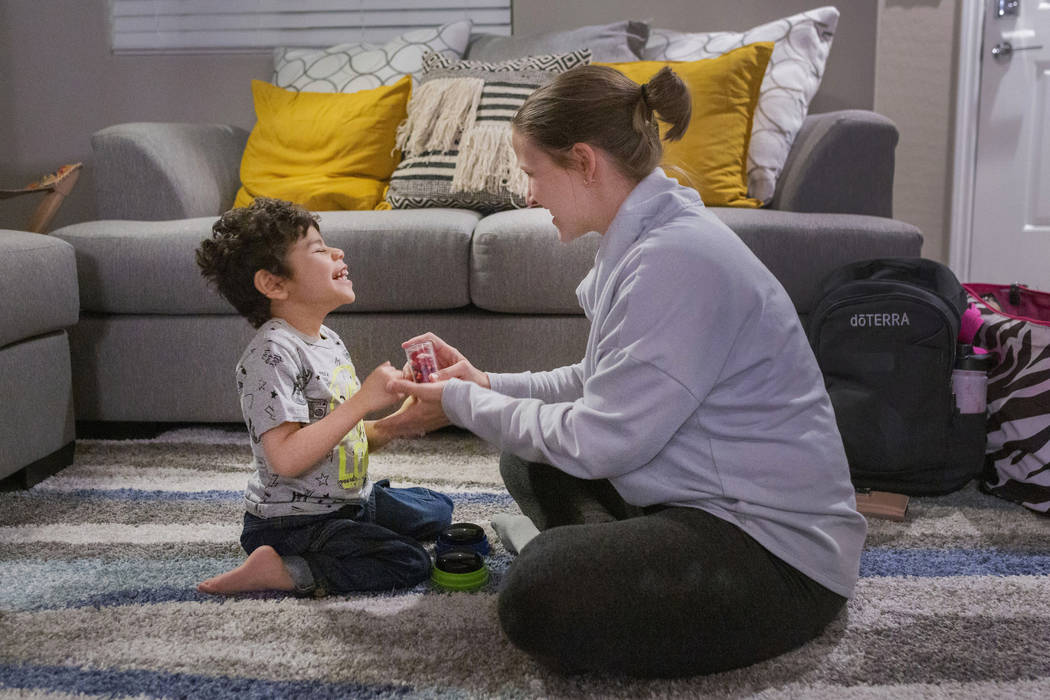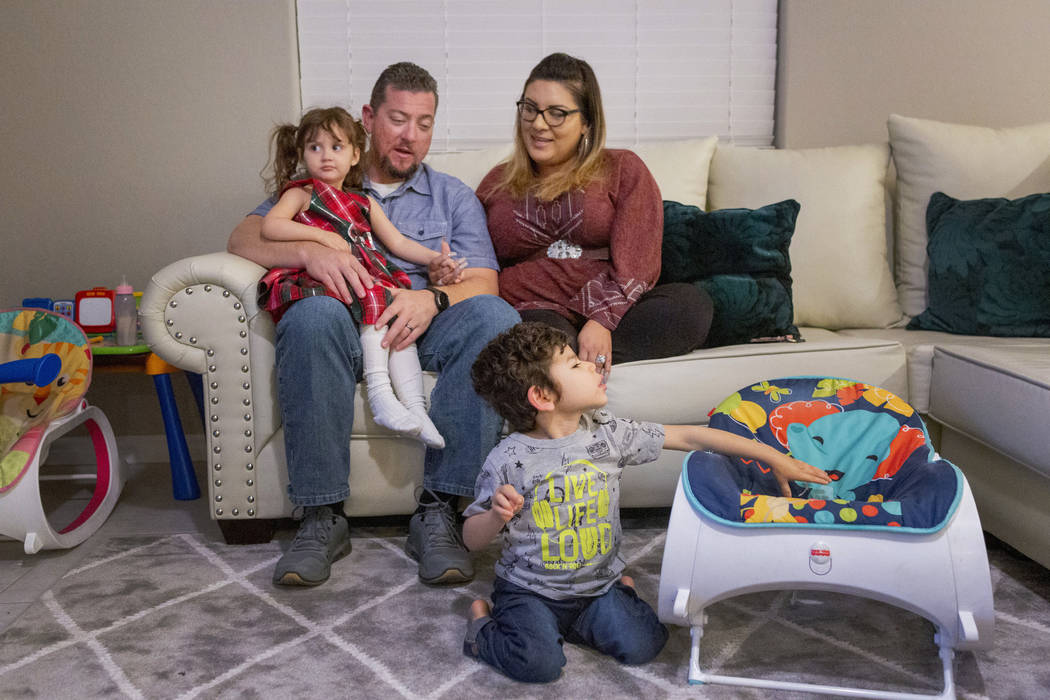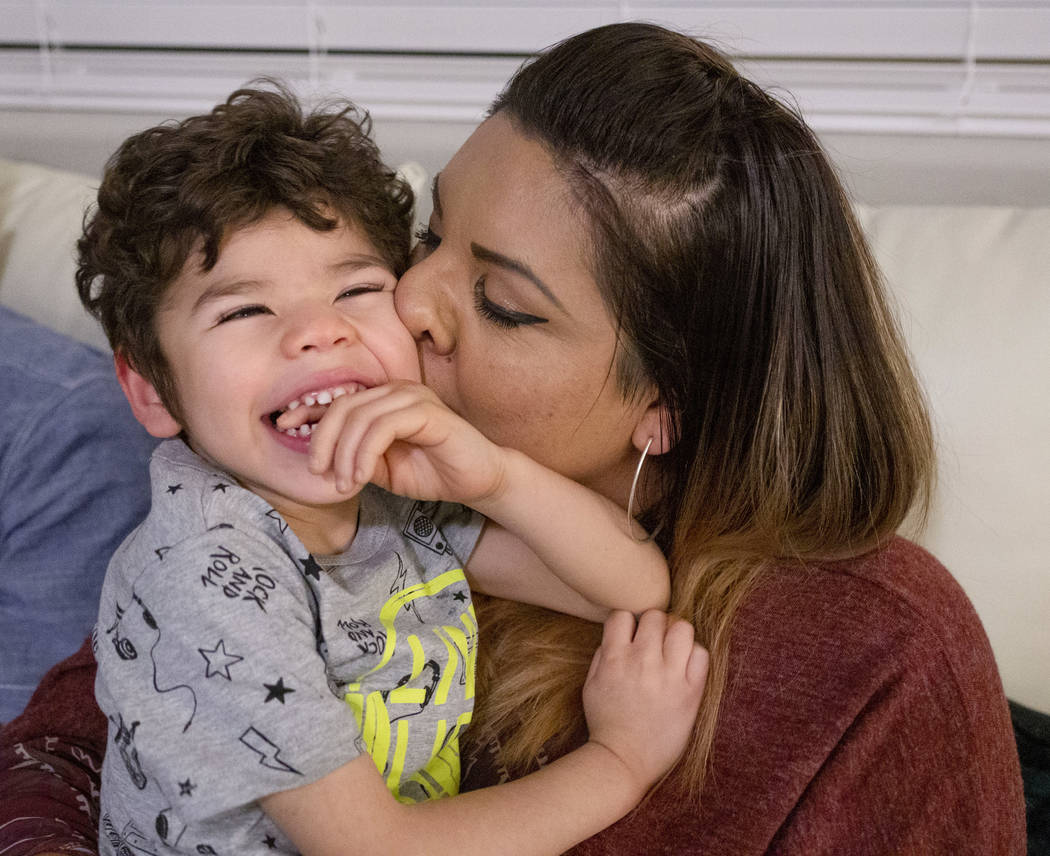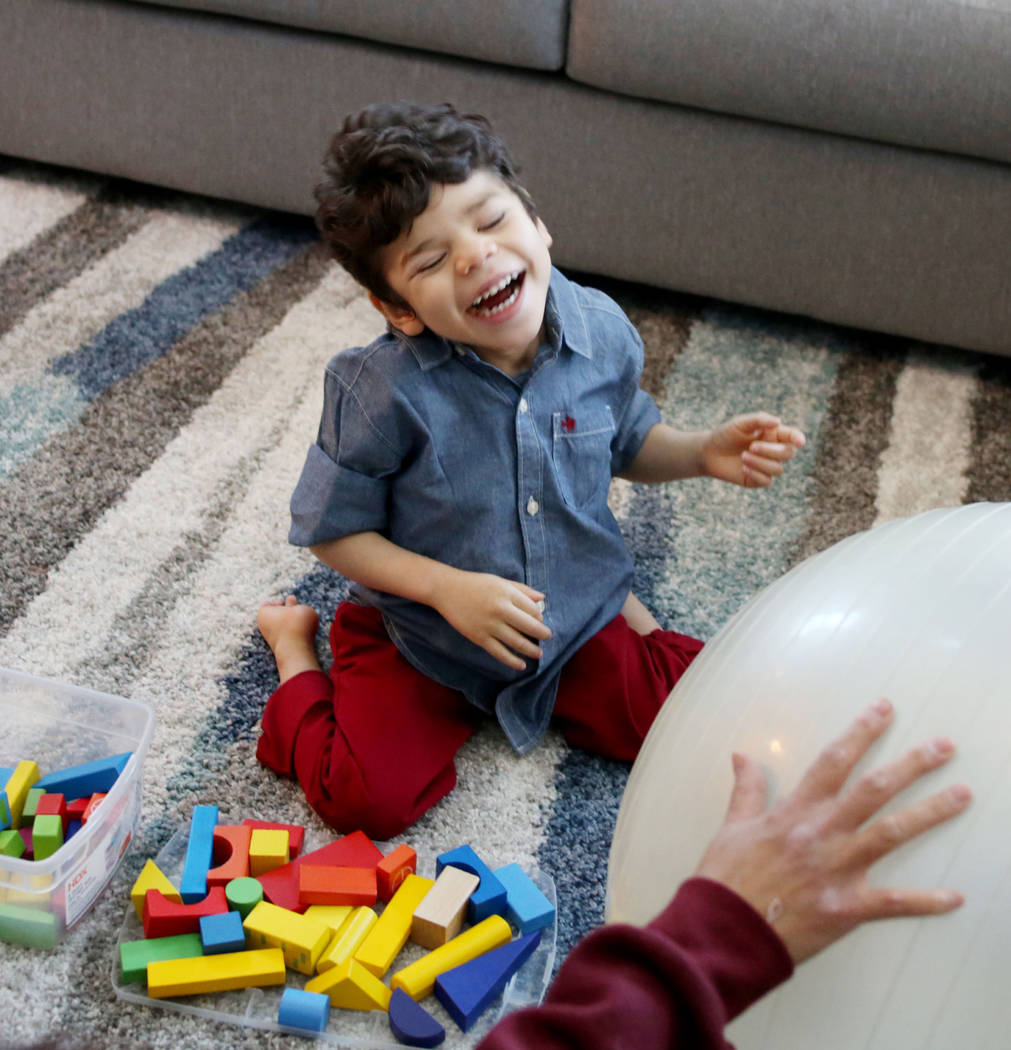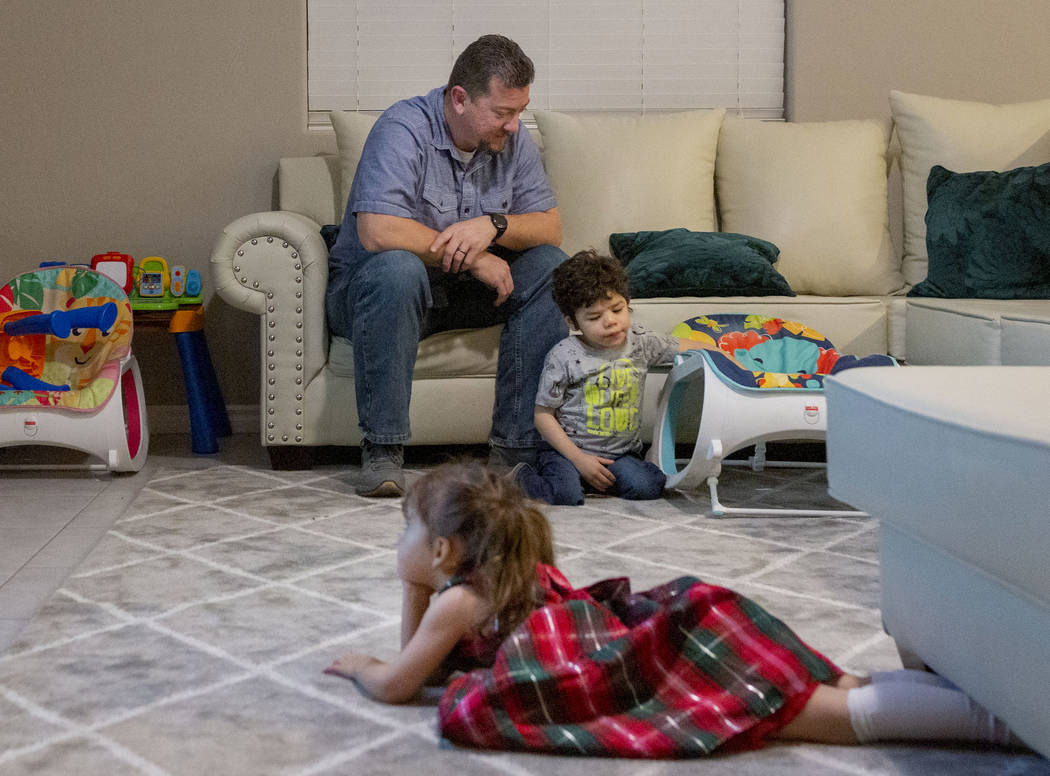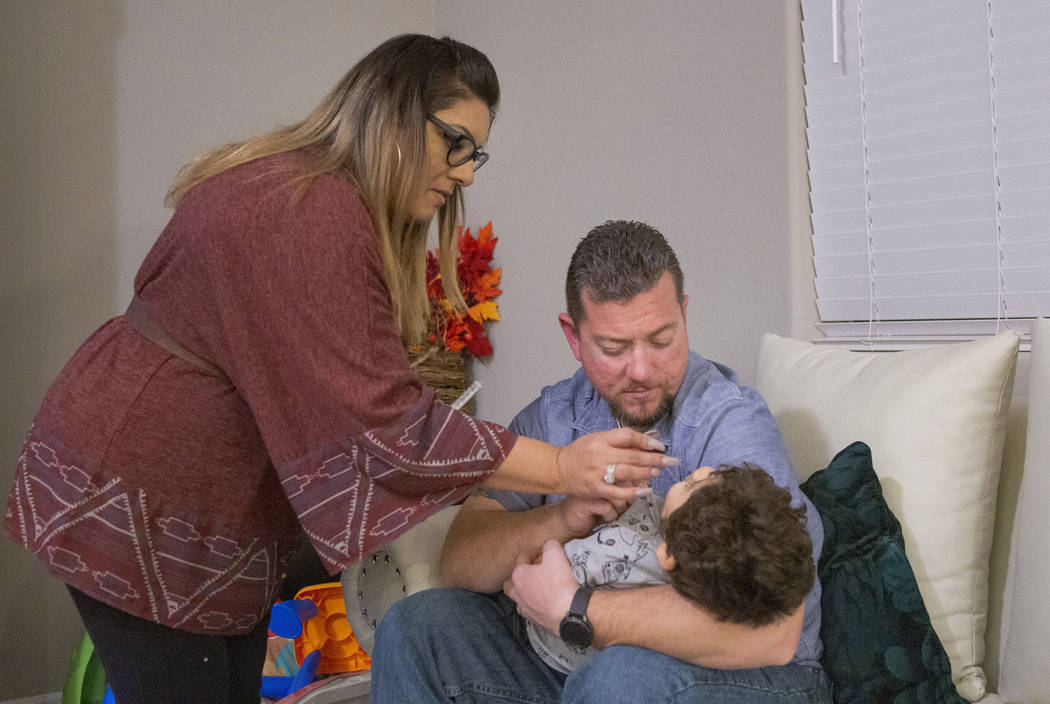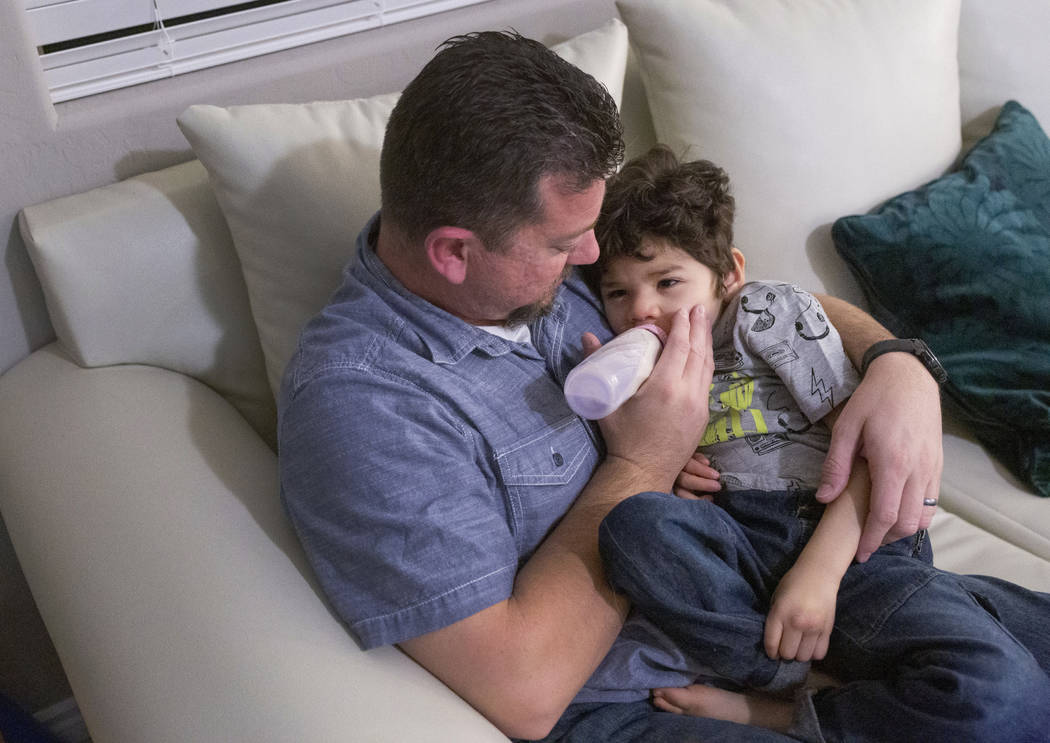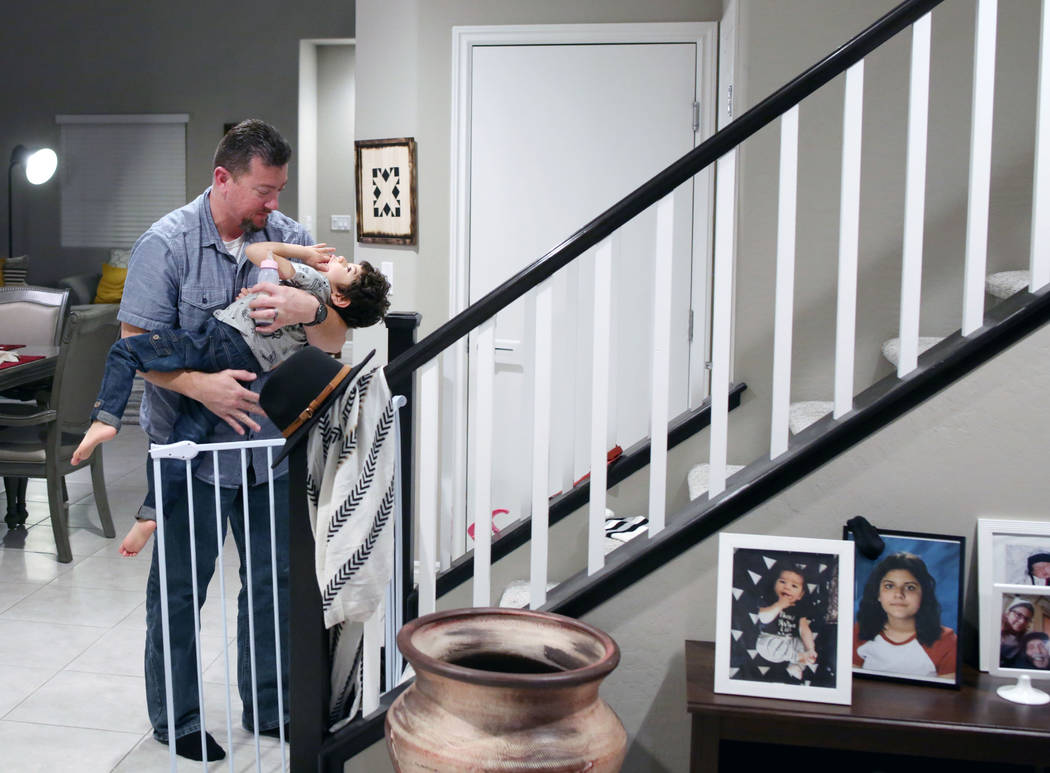Henderson couple fills big need by fostering special needs kids
Rio, a 2-month-old who had been badly abused by his father, was near death when his foster parents laid eyes on him at the hospital for the first time.
The boy was hooked up to life-support machines. His tiny hands were gray and clammy. Bleeding from his brain injury had turned the whites of his eyes almost black. Beneath the humming of the machinery they could hear him crying weakly, a sound that was more like a wheeze than a child’s wailing.
The social worker who met Mike Hansen and his wife, Cecilia, or “Cecy,” at Rady Children’s Hospital in San Diego told them to be ready for a short fostership.
“Just sit by him. Don’t let him go alone,” she said.
Mike Hansen, then a Navy petty officer 1st Class, said the size of the badly injured child underscored the gravity of the situation.
“It was like holding glass,” he recalled recently at his Henderson home. “I thought he was just going to die in our arms.”
Remarkably, Rio defied doctors’ predictions and survived not just that night, but the next and the next after that. He was taken off life support, but again defied the odds and kept breathing.
Now he’s 3, and living with cerebral palsy. Dealing with his physical and mental disabilities hasn’t been easy for the Hansens, who have legally adopted him and a 2-year-old girl they also fostered who was born to an alcohol- and opiate-addicted mother.
Raising awareness of a big need
Since adopting the children, the couple has worked to raise awareness about adoption, foster care and taking on special needs children through their family blog.
They’re also ready to add to their family, which includes Cecy Hansen’s two older kids from a previous relationship, 18-year-old Jefte and 12-year-old Dwina, and their adopted daughter, Luna. They’re also working on their foster care license in Clark County.
The need for foster parents, particularly those willing to work with special needs children, is dire in Clark County, said Jill Marano, assistant director of the county Department of Family Services, adding that the department launched a new recruitment effort in November to try to alleviate the demand.
There are currently about 3,400 kids in foster care, nearly half of whom are placed with relatives, she said.
About 500 unrelated foster parents are licensed in the county, but “only a fraction” of those are willing to take children on with special needs, Marano said. As a result, she said, about half of the approximately 60 special needs children currently in the system are still looking for homes.
“I would say we need foster parents for all children. We currently have about 70 children that are sitting in our shelter, waiting for foster homes,” she said.
“… It’s one of the most impactful ways someone can give back. Foster parents are a lifeline for a family in crisis.”
The Hansens, who were married in November 2013, decided to become foster parents after discovering they could not have children of their own. They committed from the start that they would take any child, regardless of their age or disability.
‘All of the children need love’
“All of the children need love,” Cecy Hansen said. “We weren’t going to have our own kids. We were going to be able to help and care for and love another family’s baby.”
During training in California, they learned how to care for the children with special needs, including how to communicate with biological parents. They were fingerprinted and background checked. They practiced using feeding tubes on mock babies and dealing with simulated seizures and emergencies.
Then came the final exam when Rio came home on Sept. 16, 2016 — Cecy Hansen’s 35th birthday: dealing with the severe injuries their son suffered in his first weeks of life when his biological father picked him up by the legs and slammed him on the ground several times before suffocating him, according to medical and criminal records.
The legacy of that trauma will last all of Rio’s life. His brain only functions at about 10 percent of normal capacity; a scan of it shows there’s mostly fluid in his skull.
He’s blind, paralyzed on his right side, and has no hearing in his right ear. He’ll never be able to speak in full sentences, though he uses nonverbal cues and babbling sounds to communicate with his parents.
Most kids in his condition live to be only 16 or 20, Cecy Hansen said.
“He’ll never be who he was meant to be, and that’s the hardest part,” she said.
The road already has been rough.
After Rio’s last seizure in 2017, he began to regress physically. He stopped using his hands to hold things. He didn’t feed himself.
Now, his mom feeds him Pediasure. He eats mashed bananas. But even that is risky; if his food is not blended correctly, he is at risk of aspiration pneumonia.
When he cries, the Hansens’ 3-year-old German shepherd Rosalie licks his toes. His mom also rubs him with CBD oil to help with his back pain and to prevent potentially deadly seizures.
Shouldering financial responsibility
When they adopted him, the Hansens shouldered most of the financial responsibility for caring for Rio. Though their health insurance covers some of the expense, they estimate that they’re paying about $2,500 a month for school, food, gas and therapy not covered by Medicaid. His epilepsy medication alone costs $600 every 20 days.
Mike Hansen spent five years as a military police officer and 10 years doing humanitarian work with the Naval Mobile Construction Battalion Seven. He deployed to Haiti in 2010 after a devastating earthquake, helping to recover bodies and rebuild a pier. After a tsunami in the Philippines, he and his comrades built four schools and a hospital to aid in the recovery.
He said his military experience kindled his desire to do more to help the least fortunate.
“It kind of reminds me of what they go through, how privileged we are,” he said. “Every country I’ve ever been to it seems that the people who have the least are the happiest. And they’re so grateful. It’s a real humble symbol for me.”
But he said the joys of foster parenting can also be heartbreaking, referring to foster children he and his wife raised for months before they were either placed in another home or reunited with family.
“I’ve been through wartime, and that’s harder than putting on 200 pounds worth of gear,” he said. “But you don’t even realize the need of foster parents until you get into the system and then you realize that there’s thousands of kids that just need a home.”
Over time, the couple started collecting items that reminded them of all the foster kids they’ve housed: clothes, a stuffed kitty from the 99 cent store, a letter or a drawing.
“They’ll always be in our hearts,” Cecy Hansen said. “But they come to us to show us what the world looks like in their eyes, and we were there to show them what the world should look like.”
A physical therapy session
On a recent day in their Henderson home, Rio seemed to know it was time for therapy. Luna, wearing a fancy Christmas dress, danced around the house to the children’s song “Baby Shark” on repeat — a ruse to keep her occupied while Rio did his workout.
Rio began the session by throwing a fit worthy of any 3-year-old. He tugged on his curly, brown hair and pulled on his sideburns. He pulled his socks off.
“He’s not happy; he knows he has to work,” his mom said.
To cheer him up, she played a song by his favorite musician, Blake Shelton. As soon as “God’s Country” began to play, Rio smiled and pushed the exercise ball, shaking his head back and forth to the beat.
He seemingly clapped to the music as he bent his small stomach over the ball while standing to work on his core strength.
“He won’t do it without music,” his occupational therapist, Danielle Sales, said.
Sales also works with Rio to help him better use his hands with building blocks and uses different items to help him learn to identify different objects. On this day, he was able to differentiate two scarves by their texture.
“Good job, buddy,” his mom said with an approving smile as the session ended, and Rio crawled on his left side along the carpet.
“He was told he would never be able to do this. Now, he’s scooting around and playing with his toys,” she said. “Being a foster parent is hard. But you never know, you might be the one that saves them. They might also save you.”
Contact Briana Erickson at berickson@reviewjournal.com or 702-387-5244. Follow @ByBrianaE on Twitter.



